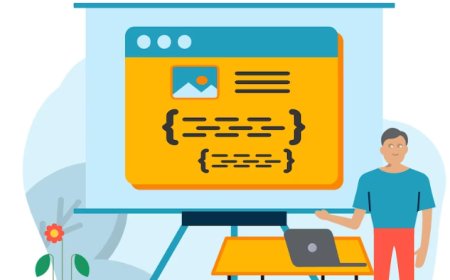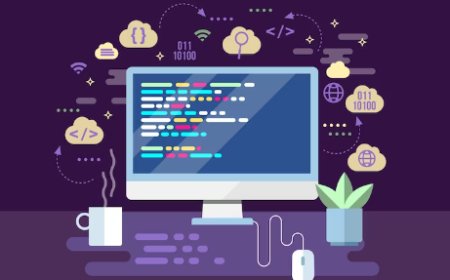Building a Career in Python: Opportunities and Growth Paths in the Field
Discover the diverse career prospects, best practices for skill development, and the key factors for success in the competitive tech industry

With the rapid digital transformation across industries, there has been a significant surge in the demand for professionals skilled in Python. This versatile programming language has emerged as a cornerstone in the tech world, powering a wide array of applications and systems with its simplicity and flexibility.
Python developers today have an array of diverse career opportunities awaiting them. From web development, data analysis, and machine learning to automation, scripting, and software development, Python's applicability extends across various domains. Its robust libraries, easy syntax, and scalability make it an invaluable asset in industries ranging from technology and finance to healthcare and beyond.
Exploring the challenges and competition within the Python job market:
As the popularity of Python continues to rise, the job market for Python developers has become increasingly competitive. Employers often seek candidates with advanced knowledge of the language, coupled with practical experience in implementing Python solutions in real-world scenarios. Additionally, the demand for specialized skills, such as web development, data analysis, and machine learning, has led to a diverse range of job opportunities, intensifying the competition among aspiring professionals. Consequently, staying abreast of the latest trends, tools, and best practices in Python development is crucial for remaining competitive and securing rewarding career opportunities in the field.
Addressing the evolving nature of Python technology and the need for continuous learning:
Python, as a dynamic programming language, is constantly evolving to meet the demands of modern technology and industry standards. With frequent updates and the introduction of new libraries, frameworks, and tools, developers must adapt to these changes by engaging in continuous learning and skill development. This includes staying updated with the latest Python enhancements, understanding the best practices for leveraging new features, and familiarizing oneself with emerging trends in the Python ecosystem. By embracing a culture of lifelong learning and professional development, Python professionals can position themselves as valuable assets within the competitive job market and contribute to the innovation and advancement of Python technology.
How can aspiring professionals kickstart their careers in Python development?
Aspiring professionals can kickstart their careers in Python development by first gaining a solid understanding of the language's fundamentals, syntax, and data structures. They can further enhance their knowledge by enrolling in Python certification courses, online tutorials, and coding bootcamps to gain practical experience and hands-on exposure to real-world projects. Building a strong portfolio showcasing their Python projects, contributions to open-source communities, and participation in coding challenges can significantly enhance their credibility and visibility within the Python job market. Additionally, networking with industry professionals, attending tech meetups, and staying updated with the latest industry trends can provide valuable insights and potential job opportunities for aspiring Python developers.
When selecting a specific career path within the Python ecosystem, aspiring professionals should consider their interests, strengths, and long-term career goals. They should assess the various domains where Python is extensively utilized, such as web development, data science, machine learning, automation, and scripting, and identify the area that aligns with their passion and skill set. Evaluating the demand for specific Python roles in the job market, analyzing the required skill sets and qualifications, and understanding the future prospects of the chosen career path are essential factors to consider. Additionally, staying informed about the latest industry trends, advancements in Python technologies, and the evolving job market landscape can help aspiring professionals make informed decisions and pursue a rewarding and fulfilling career within the Python ecosystem.
Highlighting the essential skills and knowledge required for entry-level Python roles:
For entry-level Python roles, aspiring professionals should possess a strong understanding of fundamental programming concepts, including variables, data types, loops, and conditional statements. They should be proficient in utilizing Python libraries and frameworks, such as NumPy, Pandas, and Django, to manipulate data, build web applications, and automate tasks. Familiarity with object-oriented programming (OOP) principles, version control systems like Git, and basic knowledge of database management systems (DBMS) can further enhance their capabilities for entry-level Python positions. Additionally, problem-solving abilities, logical thinking, and a passion for continuous learning are essential traits that can contribute to the success of individuals in their early Python career journeys.
Discussing the different career paths in Python, including web development, data science, and machine learning:
Within the Python ecosystem, there are diverse career paths that individuals can pursue, including web development, data science, and machine learning. Aspiring professionals interested in web development can focus on building responsive and dynamic web applications using Python-based frameworks like Django and Flask. Those inclined towards data science can leverage Python's robust data manipulation and analysis capabilities to extract insights from large datasets using libraries such as Pandas, NumPy, and Scikit-learn. Individuals passionate about machine learning can explore the development of predictive models, neural networks, and deep learning algorithms using Python libraries like TensorFlow and Keras. By specializing in these distinct career paths, individuals can carve out rewarding and impactful careers within the dynamic and evolving Python landscape.
Offering insights into the best practices for building a strong portfolio and resume in Python:
Building a strong portfolio and resume in Python involves showcasing a diverse range of projects that highlight proficiency in various Python applications and technologies. Aspiring professionals can include detailed project descriptions, implementation methodologies, and the outcomes achieved through their Python projects. Emphasizing the use of industry-relevant tools, libraries, and frameworks, along with the integration of best coding practices and design patterns, can significantly enhance the appeal of their portfolio and resume. Additionally, incorporating links to GitHub repositories, personal blogs, and contributions to open-source projects can showcase their passion for continuous learning and active participation in the Python community, further strengthening their professional credibility and expertise in the field.
Providing guidance on networking, certifications, and professional development opportunities for career growth in the field:
Networking plays a vital role in the career growth of Python professionals, as it facilitates connections with industry experts, mentors, and potential employers. Aspiring professionals can leverage online platforms, social media groups, and local tech communities to build meaningful relationships, seek guidance, and explore career opportunities within the Python ecosystem. Pursuing relevant certifications from reputable organizations and institutions can validate their expertise and proficiency in Python, providing a competitive edge in the job market. Additionally, actively participating in hackathons, workshops, and industry conferences can offer valuable learning experiences, foster professional development, and foster a deeper understanding of the latest advancements and trends in the Python field. Engaging in continuous learning through online courses, specialized training programs, and mentorship opportunities can further enhance their skill set and contribute to their career growth and success within the dynamic and evolving realm of Python development.
Continuous learning and adaptability are pivotal in the ever-evolving Python landscape. Aspiring professionals can carve a successful and fulfilling career path in the dynamic tech industry by leveraging their skills and passion for Python. Emphasizing the need for staying updated with the latest trends and technologies, the journey involves embracing change, fostering a growth mindset, and persistently honing one's expertise.





































